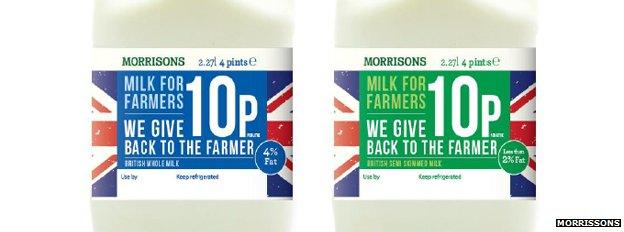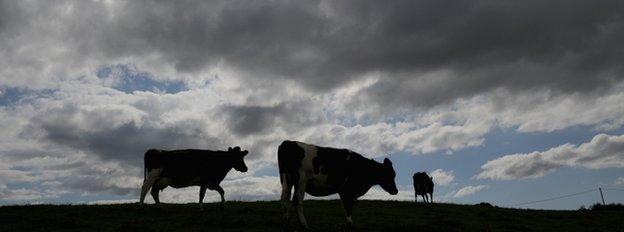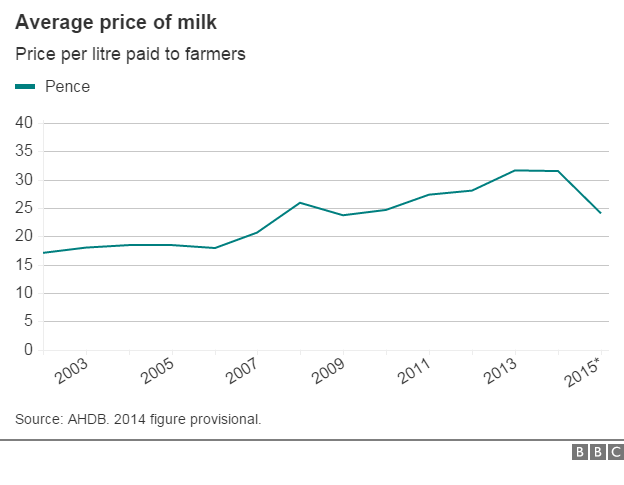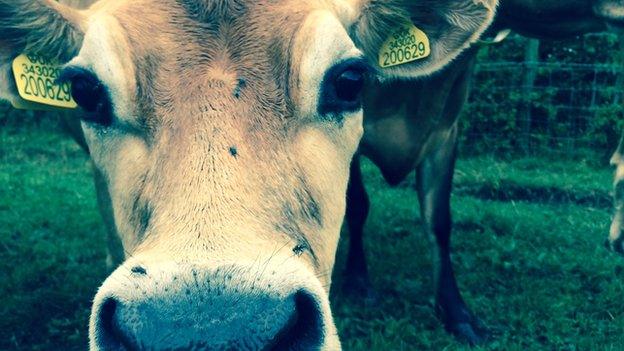Morrisons to create new milk brand for farmers
- Published
- comments
Martyn Jones, Morrisons: "Customers can choose whether they want to support British dairy"
Morrisons will sell a new milk brand which will see 10p per litre extra paid to farmers, the supermarket says.
The Milk for Farmers brand means a four pint bottle (2.27 litres), which now sells for 89p, will cost an extra 23p.
Other retailers have similar deals, but dairy organisation AHDB Dairy said 10p would make "a considerable difference".
The move comes after farming leaders met Morrisons bosses over concerns about the impact a sharp drop in the amount paid was having on the industry.
The National Farmers' Union (NFU) said it would now be writing to other sellers, asking them to follow Morrisons's lead.
The industry says a reduction in global demand for milk has led to an over-supply in the UK, creating difficult conditions for many dairy farmers.
The NFU says the "huge crisis" had already driven 256 herds out of the industry so far in 2015.

Analysis

By Claire Marshall, BBC News
What has been the initial reaction from the world of dairy farming?
In a nutshell - positive, but cautious. Farmers say that it is a good first step, but complete transparency is needed. They want to know exactly who will get the extra 10p, and how it will get to them.
Will each of the 3,000 Arla farmers get a share of the 10p? Or just those which supply Morrisons? In which case, would a separate supply group need to be set up?
One said: "It will be interesting to see if they hand on the 10p. You know, usually they find a way to make it disappear."
Paul Holt, a farmer in Staffordshire said prices were so low because fresh liquid milk was wrongly being treated like a commodity such as butter or cheese, when it was a market unique to the UK and "on the continent all you get is UHT milk".
What the new milk brand undoubtedly does is give shoppers the opportunity to clearly show their support - or lack of it - for British farmers.

The extra money from the Morrisons brand will be given directly to farmers within Arla, Britain's biggest milk co-operative.
Morrisons corporate services director Martyn Jones said: "We will be launching a milk brand that allows customers to pay a little more if they want to support British farmers. It will go into stores in the autumn."
NFU President Meurig Raymond said the move by Morrisons was a "welcome first step".
"We will continue to urge Morrisons and all retailers to ensure that farmers from all sectors who supply their food get a fair price."
The NFU said that currently Waitrose, Marks & Spencer, Tesco, Sainsbury's and the Co-op have arrangements where a farmer is paid a price above the cost of production for milk. Asda, Lidl and Aldi currently do not offer such deals to farmers.

Why has milk demand slumped?

Dairy farmers are competing in a global market place and supply is exceeding demand.
A Russian ban on imports, and a collapse in demand from China for dairy products, have played a part in the problem of falling milk prices, industry experts believe.
At the end of March the European Union lifted its quotas on the amount of milk farmers could produce.

Representatives from Morrisons met representatives from the UK's four main farming unions - the National Farmers' Union, NFU Cymru, NFU Scotland and the Ulster Farmers' Union, along with lobby group Farmers for Action.
On Monday farming unions met to develop an action plan calling for labels to indicate British products and long-term contracts for farmers.
Farmer Katie Yates: "We're having to sell more cows and calves to reduce some of the loss in margin"
Farmers have also been staging protests, including taking two cows into a supermarket in Staffordshire.
AHDB Dairy, a British not-for-profit dairy organisation, said the average UK farm gate price - which is the amount paid to farmers - fell to 24.06p per litre in May, a decrease of a quarter over 12 months.
Farmers estimate it costs 30-32p to produce each litre of milk.

Meanwhile, the NFU's former chief economist said it was "unrealistic" for farmers to believe they can be paid "whatever price they think is needed".
Sean Rickard told BBC Radio 4's Farming Today that dairy farmers were paid an average of £28,000 a year from the taxpayer.
He said: "I think it's unrealistic for anyone in that position to expect us just to pay them whatever price they think is needed to cover their cost of production."

- Published10 August 2015
